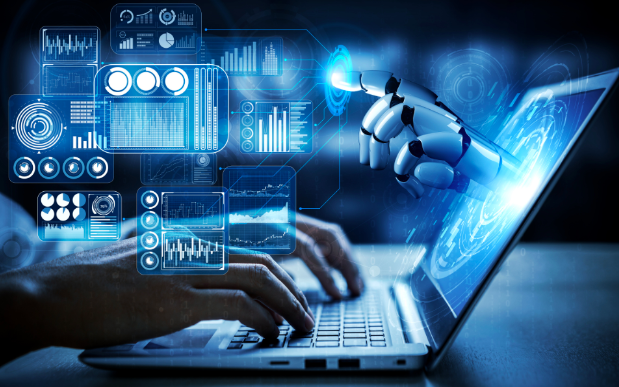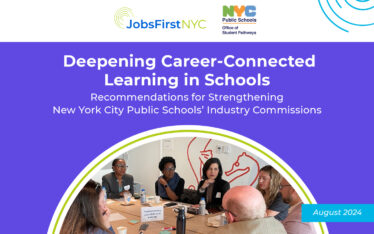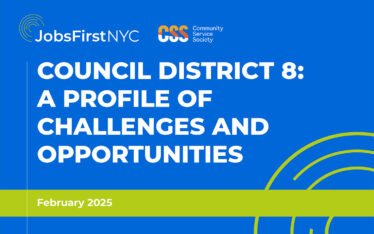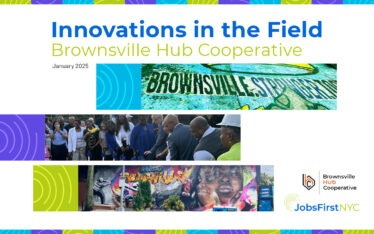Author: Lilian Roth
At JobsFirstNYC, we seek to increase the field’s understanding of trends in the economy and uncover opportunities for deeper investigation and analysis. As AI rapidly changes workforce and education, we’re paying special attention to policies and practices that ensure young adults and their communities can harness these emerging technologies to advance economic mobility, while guarding against potential dangers.
The rapid advancement of Artificial Intelligence technology is transforming the way we work. While AI impacts the entire workforce, its level of impact is predicted to vary across workers. Young adult workers, as well as Hispanic, Native American and Black workers are expected to experience the highest levels of disruption. This is due to these demographics’ dramatic overrepresentation in highly automatable jobs. For instance, nearly 30 percent of young adult workers are in high-risk jobs with over 70 percent of current task content automatable. Additionally, Hispanic workers account for 15.5 percent of the American labor force, but make up 32.6 percent of the workforce in construction and extraction trades. In the era of AI, these jobs could see half of their current tasks automated.
Schools in particular have become a key site of negotiation when it comes to weighing the promises and perils of early adoption of AI technologies. In mid-May, NYC Department of Education Chancellor David Banks announced that ChatGPT would be allowed in schools, after putting it on the list of restricted websites in November 2022. While we want to equip young people and the communities we serve with the knowledge and skills to harness these new technologies, these tools do not come without threats and challenges. We must advocate for a political and regulatory environment that prioritizes young people’s safety and well-being as they engage with AI. To collectively advocate for a safe and equitable tech future, here are some key considerations for the field.
Considerations for the Field:
Support policies that mitigate AI’s effects on income inequality. When technologies automate human labor rather than augment it, they reduce the value of workers’ contributions. More and more of the winnings go to the owners, entrepreneurs, inventors, and architects of the new systems and the labor market becomes increasingly bifurcated. To mitigate this growing inequality, experts have called for policies such as taxing capital and labor at more comparable rates, investing in human capital, as we do for physical capital, and considering workers as stakeholders alongside stockholders.
Ensure access to upskilling and reskilling for workers as jobs are redesigned to make use of AI. Despite popular themes in public discourse, scholars argue that we remain far from a world where Artificial General Intelligence (AGI) replaces human work across entire occupations. However, new skills are and will continue to be required for modern workers. More and more, workers will have to work collaboratively with machines and algorithms, understand their strengths and weaknesses, and leverage them to achieve better results. Workforce professionals can focus on how to support workers through the re-engineering of job processes and the reorganization of tasks in their workplaces, rather than focusing solely on job replacement.
Build equitable pathways to in-demand jobs in AI. AI is creating new job opportunities in fields like data analysis and programming. As businesses and organizations increasingly rely on data to make decisions, there is a growing demand for people who can collect, analyze, and interpret that data. Similarly, as AI continues to evolve, there is a growing need for programmers and other IT professionals who can develop and maintain the systems that power these new technologies. Through the Tech Sector Network, JobsFirstNYC is strengthening collaboration among workforce training professionals and employers to foster continuous learning and build a workforce that is responsive to a rapidly changing marketplace.
Support policies that protect workers from discrimination in hiring processes with automation. More and more, employers are using automated tools including resume mining, recorded video interviews, personality tests, and gamified aptitude tests to make key hiring decisions. The adoption of these tools raises significant concerns about bias and discrimination and the perpetuation of hiring inequities. This is particularly true for young adults, as seen in JobsFirstNYC’s report Online but Disconnected. To mitigate these risks, the New York City Council passed Introduction 1894 (I.1894) in 2021, becoming the first place in the U.S. to pass significant legislation on the use of automated employment decision tools. We must learn from the ways in which this bill fell short, and continue to support policies that incorporate input from impacted stakeholders to effectively address how automated employment decision tools harm marginalized workers. SkyHive, a technology company (and JobsFirstNYC partner) that specializes in workforce analysis and skills-matching solutions, just received Responsible AI Institute’s RAISE ‘Leading Start-Up’ award for ethical AI.
“When developed ethically, AI can radically improve transparency while eliminating bias in the hiring and talent management processes for employers and candidates far more efficiently than subjective human processes. It is important to work with AI that has been recognized and certified by third-party experts such as the Responsible AI Institute, as explainable and transparent,” said Sean Hinton, CEO and Founder.
Continue to shape a regulatory environment that protects young people’s safety online. The adoption of AI into learning environments raises many serious concerns. These include concerns about bias and discrimination in AI output (a product of input data that reflects inequities in today’s society) and concerns surrounding safety and privacy, particularly for students. Fears about ChatGPT’s impact on learning as well as the accuracy and safety of content initially earned the website restricted-status in New York City in November 2022. In addition to equipping educators with the tools to incorporate AI safely and effectively into their classrooms, it also will be necessary to continue shaping a political and regulatory environment that protects the safety and security of young people online.
Support K-12 educators and workforce development professionals in incorporating AI tools into career training programs as safely as possible. Despite many valid concerns with AI, educators and workforce development professionals are preparing young people for a world where understanding these technologies is crucial. Therefore, they need to be supported in using these tools safely and effectively for themselves and their students. For educators, AI can provide support on a variety of time-consuming tasks, such as testing and research. This frees up more time for them to invest in the crucial interpersonal components of teaching—something that AI tools cannot do. For learners, AI can make educational and training experiences more accessible and efficient through customization and support. While upskilling and reskilling can be expensive and slow processes, learning technologies including AR/VR offer promising opportunities for innovation in the space. Transfr, for example, is a workforce development company in the AR/VR space that offers immersive simulations to train students at any experience level, allowing them to progress at their own pace.
Leverage AI when it comes to analyzing labor market intelligence. AI technologies can provide unique insights for workforce development practitioners and job seekers. For instance, access to AI can help practitioners analyze and tackle barriers to job searching, recruitment and career pathways for those with varying qualifications. JobsFirstNYC’s Skills Mapping Academy, powered by SkyHive, uses real-time labor market intelligence and ethical artificial intelligence to analyze labor markets at the skill level. This partnership demonstrates how AI can provide critical decision-making support and feedback to workforce development practitioners and job seekers alike.
“Skills Mapping harnesses the power of AI technology to align training with the movements of the labor market, engendering a modernized and intelligent workforce development system and a more resilient workforce,” said Keri Faulhaber, Vice President at JobsFirstNYC.
Based on these considerations, we will conclude with a list of recommendations for the field:
- Government, with the input of relevant stakeholders, needs to adopt policies that protect against growing inequality and invest in reskilling programs to ensure that workers can thrive in the AI-enabled economy. Government should also adopt policies that protect the online safety and well-being of young people and pass laws that guard against discriminatory automated decision making tools in hiring processes.
- Industry, in partnership with workforce professionals and communities, needs to continue developing alternative pathways into jobs in emerging AI fields. Employers should develop policies that ensure transparent use of AI tools, while guarding against dangers. Employers should work with education and workforce training programs to develop equitable pathways into high-paying jobs in emerging fields related to AI.
- Schools and career training programs should continually learn how to best leverage the value of AI tools both for themselves and their students, while guarding against potential abuses. Government and industry need to provide the necessary resources to support them in doing so.
We are only beginning to understand AI’s impact on the future of work. These considerations and recommendations offer a starting place for deeper investigation and analysis into the policies and practices needed to set future generations up for success. JobsFirstNYC is committed to continued research and learning on these topics, as we work with our partners to advocate for a safer and more equitable tech landscape for the young people and communities we serve.





